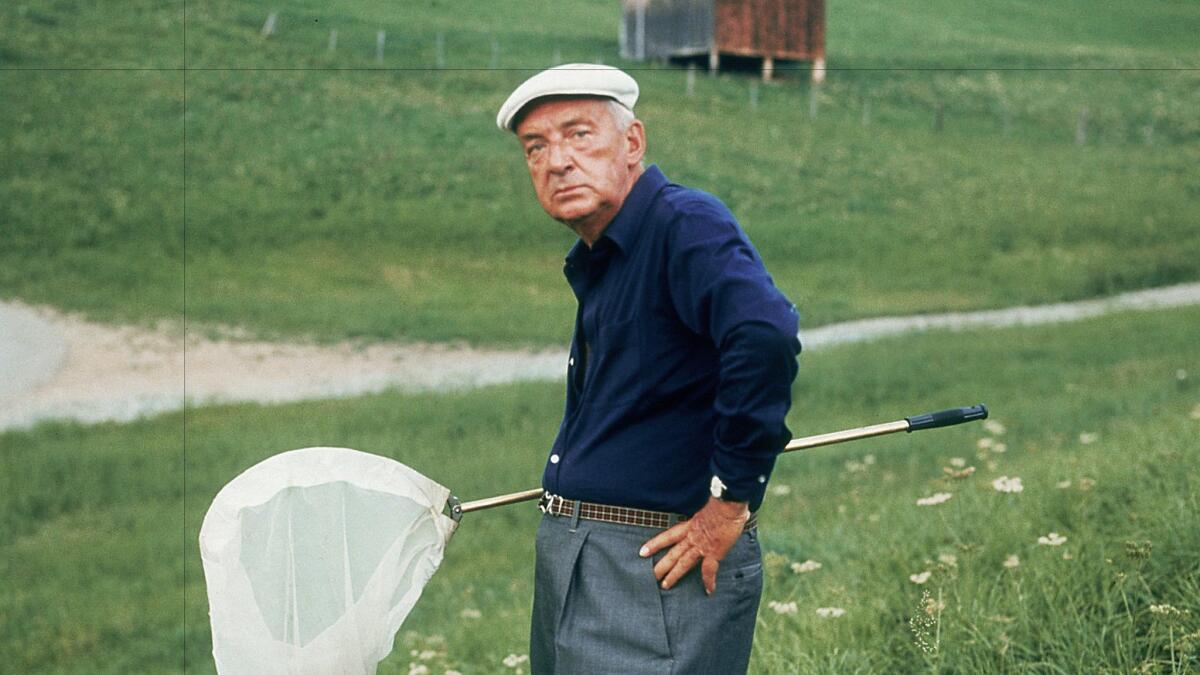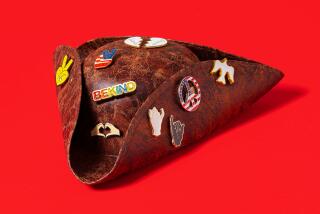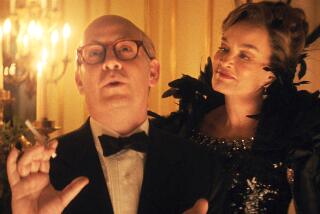When Vladimir Nabokov and Edmund Wilson went from friends to enemies: ‘The Feud’

- Share via
Novelist Vladimir Nabokov is not only one of the midcentury masters of prose but also, arguably, our greatest literary cartographer. The author of such masterworks as “Lolita” and “Pale Fire” often sketched maps of the settings of his favorite novels. One can easily find online his diagram of the trek Leopold Bloom takes across the Dublin of James Joyce’s “Ulysses,” his layout of the Samsa family flat in Franz Kafka’s “The Metamorphosis” and his topography of Sotherton Court from Jane Austen’s “Mansfield Park.” The ability to create maps from text, to envision spatially the events of a novel in detail, is a special one, and it typifies the obsessive creativity of Nabokov, one of the gods of both Russian and American letters.
Alex Beam, in his new literary biography, “The Feud: Vladimir Nabokov, Edmund Wilson, and the End of a Beautiful Friendship,” becomes a cartographer of a different type as he maps out the contours of a friendship-turned-feud. Edmund Wilson, Nabokov’s foil here, is less known now than his Russian competitor, but there was a time when he was one of the premier American critics.
Beam’s book gives us a brief but detailed sketch of how two erudite men of letters went from intimate confraternity to bitter enmity in the span of a few decades.
Their friendship began in 1940 when Nicolas Nabokov, an émigré composer who rented a house across the street from Wilson in Wellfleet, Mass., asked his neighbor if he would help his cousin Vladimir, a struggling novelist who had recently arrived in the States. “Do whatever you can,” he implored.
The two writers hit it off immediately. Wilson commissioned some reviews from Nabokov for the New Republic. “I’m amazed at the excellence of the book reviews he’s been doing for me,” he admitted. A few years later, Nabokov wrote to Wilson, “You are one of the few people in the world whom I keenly miss when I do not see them.”
It was a friendship that “fed on the oxygen of intellectual discourse.” But, though they shared some common interests, their dissimilarities were even more pronounced. Beam explains, “In many ways the two men proved to be two entirely different and contradictory people, Wilson the erudite literalist and Nabokov the ludist, the fantasist, the trickster king.” He continues, “The opposites attracted, and then they didn’t.”
The arc of the relationship is more complicated than can be described in this review — which is why it warrants a book of this nature, a short but comprehensive descent into the intertwining private and public lives of two lovable egomaniacs.
The main event that finally severed the relationship between them, though, is easy enough to name: It was Wilson’s scathing 1965 review of Nabokov’s idiosyncratic translation of Alexander Pushkin’s “Eugene Onegin” in the New York Review of Books.
Wilson’s criticisms were numerous. He pulled no punches, even though he knew these blows would land squarely on his friend’s chin. He took issue with everything from Nabokov’s “actual errors of English” to his “tedious and interminable appendix,” but perhaps took greatest aim at Nabokov’s esoteric vocabulary.
“The only characteristic Nabokov trait that one recognizes in this uneven and sometimes banal translation,” Wilson opined in his infamous hatchet job, “is the addiction to rare and unfamiliar words.” He admonishes his “personal friend” for his use of “mollitude” rather than “languor,” and for choosing the obscure term “sapajous,” when he could have used the more obvious word, “monkeys.”
Beam, a columnist for the Boston Globe, treats both men with affection but never lets either off the hook for their pomposity. In his introduction, he explains that when he first heard of this feud, and their pedantic exchanges, he couldn’t help but laugh.
“Several years into this project, I laugh less now,” Beam admits. His book still manages to be humorous — how could the tale of a relationship ruined by word choice be anything but funny? — but it is buttressed with a bittersweetness because, as the author states, “the end of a friendship is always a loss.”
The book takes a line from Samuel Johnson’s “The Uncertainty of Friendship” as its epigraph: “Life has no pleasure higher or nobler than that of friendship. It is painful to consider, that this sublime enjoyment may be impaired or destroyed by innumerable causes, and that there is no human possession of which the duration is less certain.”
At the end of that essay, Johnson compares the death of a friendship to the death of a person. The comparison is apt because friendships are everything they are — beautiful and fragile, tragic and knotted — because they are so dreadfully human.
Christopher Hitchens once wrote of us humans, “Evolution has meant that our prefrontal lobes are too small, our adrenal glands are too big, and our reproductive organs apparently designed by committee; a recipe which, alone or in combination, is very certain to lead to some unhappiness and disorder.”
There are many reasons to read a literary biography — many of which coincide with the reasons we read other books — but these retellings of literary lives offer one special treat that few other texts can give: They remind us that even the greats, those who fill our artistic pantheons, ate, had sex, argued with their loved ones, drank too much alcohol, fought with their friends and failed as often as they succeeded.
They too have prefrontal lobes that are too small, adrenal glands that are too big and reproductive organs apparently designed by committee. They too are saddled by animalistic drives, primitive motivations and human failings. We read about the lives of great artists for the gossip, for the blood and the guts, the wounds. It helps to see our heroes at their worst because if they too were imperfect, these titans of our world literatures, then maybe we’re not so bad ourselves. Literary biographies remind us that even the gods are human — primates, like the rest of us, just a few chromosomes away from the sapajous.
Malone is a writer and professor of English. He is the founder and editor in chief of the Scofield and a contributing editor for Literary Hub.
“The Feud: Vladimir Nabokov, Edmund Wilson, and the End of a Beautiful Friendship”
By Alex Beam
Pantheon: 224 pp., $26.95
More to Read
Sign up for our Book Club newsletter
Get the latest news, events and more from the Los Angeles Times Book Club, and help us get L.A. reading and talking.
You may occasionally receive promotional content from the Los Angeles Times.






